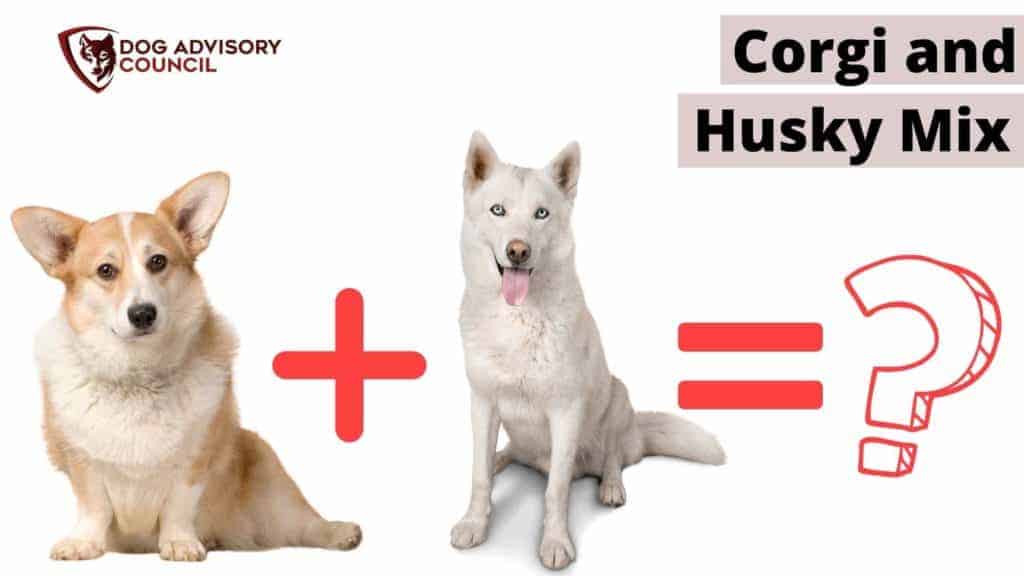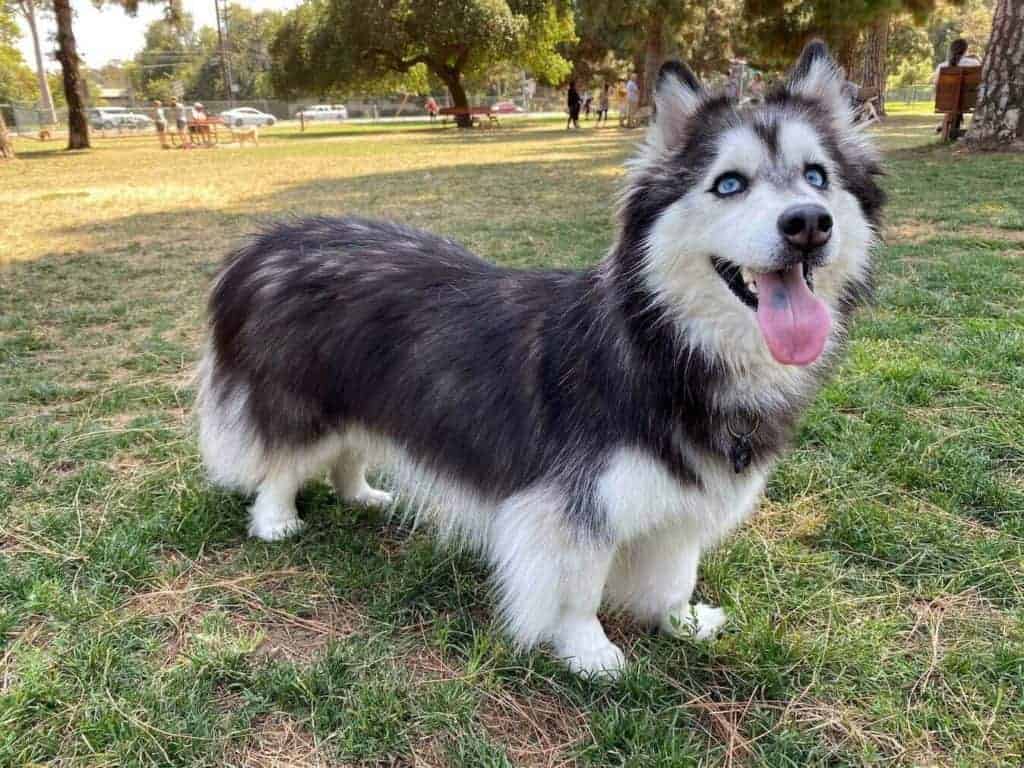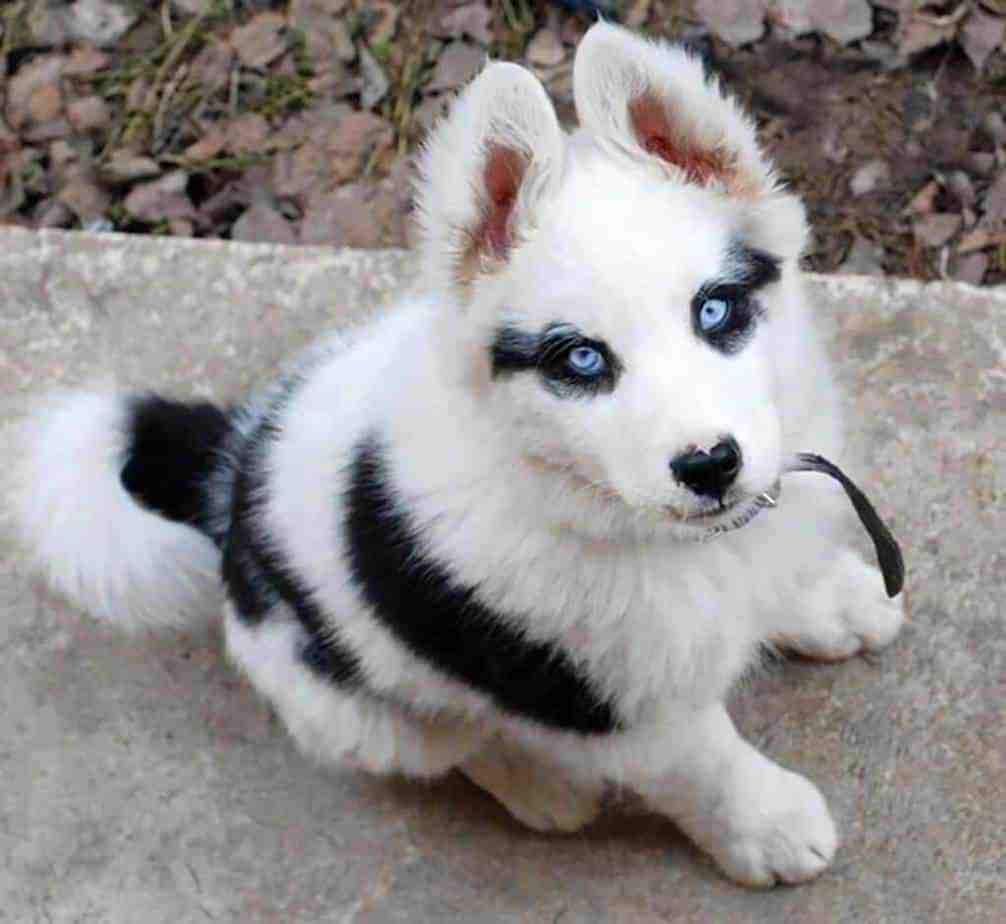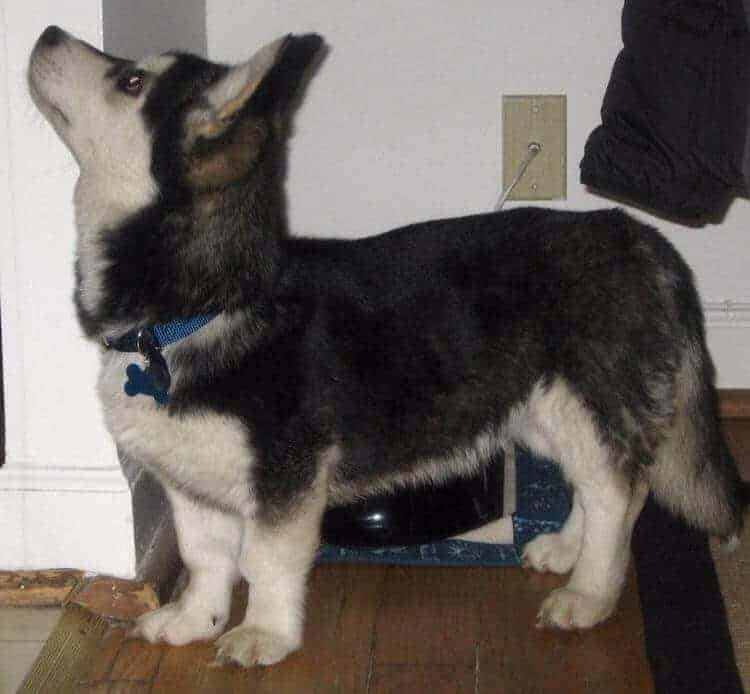
Corgis are among the most popular dog breeds out there, primarily because of their chunky and adorable status, physically speaking. Huskies are also popular breeds for their goofy traits.
Need more information on the mix? You’re in for a great read!
This mixed breed dog is a popular one. It is a mix between a Corgi and a Siberian Husky. They essentially look like huskies with tiny short legs. They tend to be 12-15 inches (30-38 cm) high at full growth and weigh between 20-50 pounds (9-22 kg).
They are friendly, goofy, active herding dogs. They do have a few small-dog-specific health concerns but are generally healthy.
What is a Corgi and Husky Mix called?
There are two main designer breed names used. The most popular one is Horgi. Others call them Siborgis, though, which pays more tribute to the Siberian part of the Husky in the mixed breed!
What does a Corgi and Husky Mix look like?
As far as searches online, this is where things get really fun! A Horgi is going to look…well blended. What does that mean? Picture a husky in their tail, head, markings, and personality….but with short little stubby legs. That’s what most of them look like!
While you can get some that take on Corgi-shaped snouts and don’t have as many markings that Huskies do, of course, the short-legged Husky is often the classic profile that you can expect in this mix breed!
Coloring wise, the most commonly seen fur choices are:
- Brown
- Grey
- Black
- Brindle
It’s considered uncommon for a dog to be one of these colors. They’re often two to three hues, and they may or may not have the classic Husky markings around their faces.
As far as fur texture, it depends on genes. Some with stronger Corgi genes will have thinner and softer fur. If the Husky is more pronounced, it’ll be longer, denser, and a bit wirier to the touch.

How big can a Corgi Husky mix get?
Huskies are, of course, big dogs. Corgis are small dogs. This means that your sweet Horgi is going to be somewhere in the middle. As noted above, most will be 12-15 inches (30-38 cm) and 20-50 pounds (9-22 kg). If the Husky genes are stronger, they can be bigger and heavier.
One of the most common misconceptions about this mixed breed is that their small size makes them great for apartment living, but this is not the case.
While they are small, these are still active dogs and can be somewhat of a “bull in the china shop.” They get excited and knock things over when playing. A Horgi will need room to play and move.
Is the Corgi Husky mix hypoallergenic?
This is a hard no. This mix has medium to thick fur and is considered to be amongst the highest shedders! Even if you have one where the dominant Corgi genes make for a puppy with slightly thinner fur, these are still high-shedding dogs.
No dog is technically hypoallergenic, but the Horgi is the exact opposite. These are not going to be good dogs for homes with pet allergies or asthma.
What’s the lifespan of a Corgi and Husky mix?
Small dogs live longer than large dogs in most cases. Since they are a comfortable mix of small and large, the lifespan is likewise somewhere in the middle at 12-15 years.
While there are some health complications thanks to the small dog breed from the Corgi, these 12-15 years are often happy and healthy without too many complications.
Of course, regular and proper care of your dog will be important to help him have as many healthy and happy years. More on that in a little bit!
The temperament of a Corgi and Husky mix
If you were to summarize the overall temperament and personality of a Horgi, it would be this: instant besties. They love, love, love people. It makes no difference whether you and your family, new strangers on walks, the mail carrier, or someone in the mall parking lot. This mixed breed is going to want to meet everyone.
This long list also includes other household pets. The only thing worth noting here is that the Husky in them can make for a strong prey drive. Small household pets like hamsters, or even cats, can cause a bit of a problem if they aren’t appropriately trained (more on that in a bit).
They can be mischievous, thanks to the Husky, so you will need to make sure that they have plenty of toys to play with — otherwise, they’ll make their own!
They should be trained for obedience if this ever happens, and they are great candidates for advanced training such as competitions and more to help keep their brains active.
Siborgis are not aggressive and are more prone to be friendly to an intruder than anything else. They are alert and focused, so they are excellent choices for playing fetch, hide-and-go-seek, and more.

Are Corgi and Husky mixes good family dogs?
As the temperament above may prove, there is no question that this mixed breed dog definitely makes a great family dog! Not only are they attentive and loyal to their families, but they also are great with children and other pets (with caution), so they are often easy to add into the family lifestyle with as few bumps as possible.
They are natural shepherding dogs, too, which means that they will naturally stroll around your children and keep an eye on them to stop them from wandering too far in the backyard, etc. While this also means that they can nip at the hands or feet, you can help train this out of them!
Some families automatically connect a family dog with a guard dog, which wouldn’t be the case here. A Horgi will try to be instant besties with an intruder, especially if they have a treat and want to pay attention to them, too. These should never be used as guard dogs!
A Horgi’s health issues to be aware of
There are some health issues to know about when it comes to a Horgi. Most of these come from the Corgi genes. Even if you have a dog that has more Husky in it, you will still want to know about them so that you can help your dog live its best life!
- Back concerns
- Degenerative myelopathy
- Dysplasia
Back concerns
Because a Corgi has a long back, they are prone to back problems. This is often worsened by their short stubby legs, which put more impact on their spine.
One of the most common ones is going to be herniated discs. This is painful and serious but can be treated with proper diagnosis and treatment from a vet.
Degenerative myelopathy
This is technically another back problem, but it is severe enough that you really do need to understand it as a separate risk.
This is when the spine degrades over time, and it can impact the central nervous system. This leads to progressive numbness and paralysis in the hind end. This is something that an experienced vet can detect early. Proper diet, exercise, and attention from a vet can be helpful.
Dysplasia
Because of its squished legs and long spine, dysplasia of the hip joint and elbow joint is common. This is when the joint and bone don’t go together as they should, leading to concerns and problems with movement similar to arthritis.
How much does a Corgi and Husky mix cost?
Loving what you’re hearing? If so, you’re going to be wondering this question! Since they are popular and relatively easy to breed if you are a professional dog breeder with experience, this means that there are several sourcing options. They often will cost between $300- $1 000.
Some rescues will have them, too, so you’ll definitely want to check out the rescue shelters to see if you can enjoy a lower price. Then there’s also the fact that “adopt don’t shop” tends to be a great starting point if you are okay with “rolling the dice” on the genetics.
How to take care of a Horgi
If you’re looking to do everything that you can for your sweet mixed breed, there will be a few focus areas for their best health. These include:
- Grooming
- Dental hygiene
- Eating
Grooming
This is first on the list for a reason! These are heavy shedders, as mentioned above. Even when it’s not the season to blow their coat, they are still going to need to be brushed every day.
You’ll want to invest in a comb or glove that is meant for long fur. It makes it tug-free, and it also will help disperse the oil throughout their fur and promote blood circulation. Plus, it’s a great bonding experience with your dog.
You’ll need to bathe your Horgi every 3-4 months, too. Perhaps more frequently in the shedding season. This helps keep their fur clean and their skin hydrated and comfortable, too. You’ll want to go with a groomer that is experienced with Huskies and their fur’s needs.
Dental hygiene
Corgis are prone to dental problems, so you’ll need to make sure that you get them used to having their teeth brushed. You can do this with a toothbrush and doggy toothpaste. It can be aided by dental treats for teeth cleaning and toys.
Dental problems can impact your dog’s overall quality of life, so this is definitely something not to overlook. The sooner that you get them used to having their teeth brushed, the better. It should be as routine to them as having you brush their fur.
Eating
This can be a big problem, thanks to the Husky breed. Known for scarfing down every kibble of food, these are prone to overeating. You’ll need to portion their food carefully to ensure that you aren’t overfeeding them as they grow. This can lead to obesity.
You’ll also want to choose a dog food that is going to be prime for this breed. Your breeder or your vet will be great options for this since they will know the common “problem” points for a diet with both dog breeds!
Don’t forget to carefully portion their treats, too. They will eat as many of those as you give them and many loving and well-intentioned pet parents like to be treat-happy.

Pros and cons of a Corgi and Husky mix
There are great pros and cons to consider with this sweet Siborgi. Here are some of the essential points that we’ve covered that will help you keep all of the crucial facets in mind.
PROS
- Friendly with everyone
- Great with kids
- Alert and attentive
As far as family dogs, they are great choices. They are friendly, kid-loving, and alert, and attentive to everything that is going on. They’ll be happy curling up for a movie or going for a hike or a play session in the backyard. They just enjoy being out and about with their favorite humans.
They also are smaller than traditional Huskies, so it makes them a bit easier to control as far as leash training and so on. It’s like having a mini Husky if that’s what you’re looking for. Plus, the Corgi features are pretty adorable.
CONS
- Don’t like to be left alone
- Need socialization with other pets
- Require a strong hand with training
All of these personality traits come with a few downsides, as you can imagine.
They aren’t too fond of being left alone for long periods of time. If you work traditional 9-5 jobs and are gone for quite a while on the weekends, Horgis can get lonely and stressed. This leads to boredom and destruction.
While it’s common for many parents to have to work, of course, you’ll want to consider something like puzzle toys and other interactive options that will help your dog to enjoy some fun and stimulation exercise while alone. As well, walking before and after work is going to be a great way to help literally run off some of that energy, too!
They are alert and attentive, but they will need a lot of help with training as far as socialization goes. Surprisingly while they aren’t stubborn, they can have some prey drive that makes them go after small household animals.
This is something to expose them to and then train out of them with classic methods. Your vet can offer some advice on this, and there are dog training classes, too, for this issue.
While a loving and responsible pet parent should properly socialize all dogs with other dogs and other pets, Siborgis are important to prioritize in socialization due to that natural prey drive.
If your dog does go after a small animal during training and it scares you (and those around you), it’s understandable to want to blame the dog.
Please remember that this instinct is hard-wired into your dog’s brain. They don’t understand that this is not what they’re supposed to do, which is what makes training so important.
Socialization training helps minimize any potential harm and possible complications from that prey drive getting out of control. As well, general obedience training will help a lot too. Since they will know the command to “stop” or “drop it,” etc., they’ll listen to that even when the prey drive kicks in unexpectedly.
In brief
A mix between a Corgi and a Siberian Husky, a Horgi is a small-sized dog that often ends up somewhere between 12-15 inches (30-38 cm) and weighs between 20-50 pounds (9-22 kg) when fully grown.
They often look like Huskies with short legs. They are intelligent, affectionate, and can have a strong prey drive.
Without question, these mixed dogs are great family choices, even with their strong prey drive. Proper care of their diet, exercise, and grooming are all essential details to help each dog be at their best!
